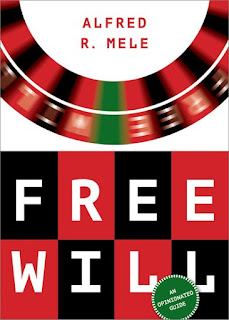 twelve previous books and over 200 articles and editor of seven books. He is past director of two multi-million dollar, interdisciplinary projects: the Big Questions in Free Will project (2010-13) and the Philosophy and Science of Self-Control project (2014-17).
twelve previous books and over 200 articles and editor of seven books. He is past director of two multi-million dollar, interdisciplinary projects: the Big Questions in Free Will project (2010-13) and the Philosophy and Science of Self-Control project (2014-17).
Mele applied the Page 99 Test to his new book, Free Will: An Opinionated Guide, and reported the following:
From page 99:Learn more about Free Will at the Oxford University Press website.I’ll repeat, from chapter 5, my description of one way of thinking about the problem of present luck as it arises in the story I told there:Would browsers who open my book to this page get a good idea of the whole book? Well, they would get the idea that the book is at least partly about free will and arguments for skepticism about it and that connections between free will and luck are examined. In a way, this amounts to a decent idea of what about forty-five percent of the book is about. What I do in much of the book is to develop two different ways of conceiving of free will and to explore the pros and cons of those two conceptions – both of which I regard as serious contenders. What I refer to as “the problem of present luck” is a deep and interesting problem that proponents of one of those conceptions have to deal with. One thing I do in the book is to offer a solution to that problem, one that takes us back to what might be our earliest free actions as children and then gradually moves forward in time, paying special attention to character development in a universe like Joe’s. The other conception isn’t directly threatened by the problem of present luck, but it has problems – and advantages – of its own. I explain why many philosophers find the latter conception attractive and try to give readers a good feel for its attractions. The final chapter rebuts some highly touted neuroscience-based arguments for the claim that free will is an illusion. So why did I say forty-five percent? If we were to subtract that last chapter, each of the two conceptions of free will featured in the book would have accounted for about half of the total page count, and the final chapter is roughly ten percent of the book. There you have it. Incidentally, I thought for a while about whether including this calculation was a good or a bad idea. As you can tell, I decided to include it. Maybe in another possible universe that is exactly the same as ours up to the moment I made that decision, I decided otherwise.If there is nothing about Joe’s abilities, capacities, state of mind, moral character, reasoning, efforts at self-control, and the like in either universe that accounts for the difference in what he decides, then the difference seems to be just a matter of luck. And given that neither universe differs from the other in any respect at all before he makes his decision, there is no difference at all in Joe in these two universes to account for the difference in his decisions.This statement applies just as well to the present story in which Joe agent-causes his decision. In one universe he agent-causes his decision to rob the store, and in another universe in which everything is the same right up to the time of decision, he agent-causes a decision not to rob the store.
It’s difficult to see how agent causation, understood simply as a causal relation between an agent and an event, even makes a dent in the problem of present luck. Perhaps that is why some philosophers have wanted to build it into the very notion of agent causation that agent-causing an event is sufficient for freely causing it. We’ll return to this issue later.
The stage is now set for one of the skeptical arguments about free will that we’ll be examining in this chapter.
--Marshal Zeringue



